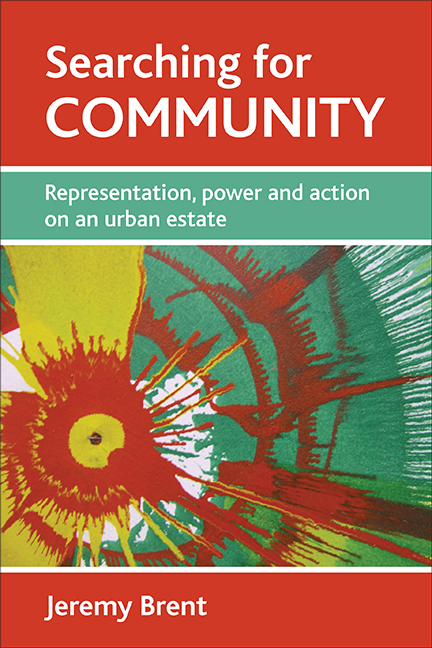Book contents
- Frontmatter
- Contents
- Foreword
- Notes on the author
- Introduction
- one Four settings: contexts and questions
- two Researching Southmead: problems of representation and participation
- three The intelligent outsider? Official and media representations of Southmead
- four Knowledge from within: community art and local representations
- five The outsider within: crossing worlds
- six Young people and community: trouble and tribes
- seven Four examples of community action in Southmead
- eight What is community anyway?
- nine Engaging with community
- ten Communicating what youth work achieves: the smile and the arch
- Author’s acknowledgements
- Epilogue: Southmead eight years on
- Afterword: Why Jeremy Brent’s work is more relevant than ever
- Bibliography
- Index
seven - Four examples of community action in Southmead
Published online by Cambridge University Press: 22 January 2022
- Frontmatter
- Contents
- Foreword
- Notes on the author
- Introduction
- one Four settings: contexts and questions
- two Researching Southmead: problems of representation and participation
- three The intelligent outsider? Official and media representations of Southmead
- four Knowledge from within: community art and local representations
- five The outsider within: crossing worlds
- six Young people and community: trouble and tribes
- seven Four examples of community action in Southmead
- eight What is community anyway?
- nine Engaging with community
- ten Communicating what youth work achieves: the smile and the arch
- Author’s acknowledgements
- Epilogue: Southmead eight years on
- Afterword: Why Jeremy Brent’s work is more relevant than ever
- Bibliography
- Index
Summary
Introduction
A recurring motif in the writing about Southmead from outside has been that of lack of community. In contrast, there have been assertions of community that come from within, as in the community play, but even in these instances community was seen as a thing of the past, currently lacking. Moving around Southmead, there is a sense of fluidity, of nothing as solid as something that could be called community. Instead, there is a strong sense of place, but place as fractured. The activities of young people described in Chapter Six display collectivities based on a yearning for connectedness, but a connectedness that is always temporary and shifting. However, despite all these signs that Southmead is not a community either in or for itself in any stable form, there are a number of vigorous organisations in the area that proclaim both Southmead and community as bases for social action, active users of the term community. This chapter looks at four of these organisations: the Southmead Project (SP), a drugs project; the Southmead Development Trust (SDT), a charity and limited company that runs a training and leisure centre; Southmead Parents’ and Children's Environment (SPACE), a group of parents running activities for children; and Voice of Southmead, an anti-drug dealer campaigning group that lobbies for improvements and provides activities for young people.
This is by no means an exhaustive list of all the local organisations that exist. At a meeting of the Southmead Estate Working Party, a local umbrella group, in October 1994 (before three of the organisations mentioned above had been formed), there was a discussion as to whether it was good or bad that there were 28 different groups operating in the area: did this number show strength or division? This question is considered crucial if unity is seen as important to community, what Bhabha calls the ‘progressive metaphor of modern social cohesion – the many as one – shared by organic theories of the holism of culture and community’. I could not write about every one of these groups; even in writing about just four of them I will only be able to provide a limited discussion of each.
- Type
- Chapter
- Information
- Searching for CommunityRepresentation, Power and Action on an Urban Estate, pp. 175 - 202Publisher: Bristol University PressPrint publication year: 2009



